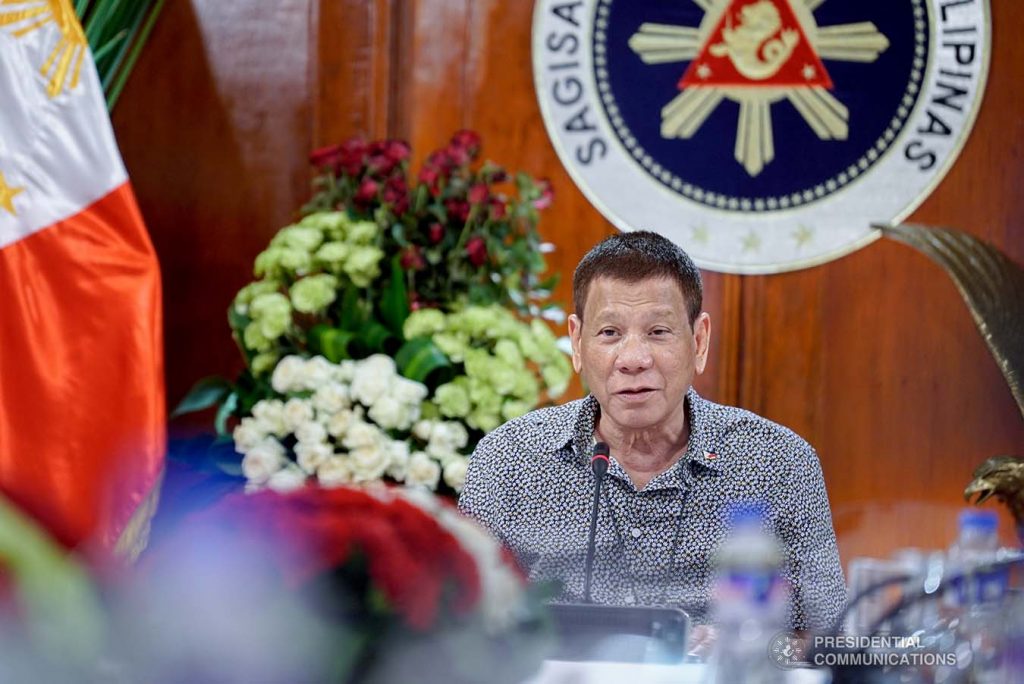Headline
Duterte seeks dialogue, not shutdown of Facebook: Palace

FILE: President Rodrigo Roa Duterte talks to the people after holding a meeting with the Inter-Agency Task Force on the Emerging Infectious Diseases (IATF-EID) core members at the Malago Clubhouse in Malacañang on August 31, 2020. KING RODRIGUEZ/PRESIDENTIAL PHOTO
MANILA – Malacañang on Tuesday said President Rodrigo Duterte was not threatening to stop the operation of Facebook in the country when he scored the social media giant for taking down accounts and pages advocating “something” that is good for the people.
In a press briefing, Presidential Spokesperson Harry Roque said Duterte is open to a dialogue between the government and Facebook.
“Hindi naman po (No, it’s not),” Roque replied when asked if Duterte’s remark was a threat. “Mag-uusap po sila. Ang sabi ni Presidente kinakailangan mag-usap (They will talk. The President said they need to talk).”
He said banning Facebook would be unfavorable, not only for Facebook but also for Filipinos.
“Well, alam ninyo po parehong hindi mabuti iyan sa Facebook at sa Pilipinas ‘no, number one po kasi sa buong mundo tayo sa Facebook ‘no (Well, [the ban] would not be good for both Facebook and the Philippines, considering that we are number one in the world [for using] Facebook,” Roque said.
Roque said Facebook’s recent move is an act of censorship that suppresses freedom of speech.
He questioned the social media platform’s singling out of pro-government pages by ignoring pages that criticize the administration.
“Ang kongkretong aksiyon po ay huwag pong supilin ang kalayaan nang malayang pananalita ng mga personalidad o mga pages na pabor po sa gobyerno. Kasi ang nangyayari po, kapag laban sa gobyerno hindi po tinatanggal ng Facebook; kapag sumusuporta sa gobyerno natatanggal po (The concrete action is not to suppress the freedom of speech of personalities and pages in favor of the government. What’s happening is those [pages that are] against the government are not removed by Facebook; but those that support the government are taken down],” Roque said.
In his public address on Monday, Duterte hit the social media giant after it recently shut down pages allegedly linked to the military and police for “coordinated inauthentic behavior” last week.
“Tell me, kung bakit hindi ko magamit para sa kapakanan ng taong bayan (Tell me, why I cannot use (Facebook) for the welfare of the people). If government cannot use it for the good of the people, then we have to talk. We have to talk sense,” Duterte said.
Duterte said the government allows Facebook to operate in the country hoping it could help in advocating what is good for the people.
“Now, if government cannot espouse or advocate something which is for the good of the people, then what is your purpose here in my country?” Duterte said.
The President said his government is not advocating mass destruction but fighting insurgency that has killed thousands of soldiers and civilians in more than 50 years.
“You know Facebook, insurgency is about overturning government. What would be the point of allowing you to continue if you cannot help us,” he said. “We are not advocating mass destruction, we are not advocating massacre. It’s a fight of ideas.”
He said Facebook must explain its “sweeping move” against the Facebook accounts detailing the atrocities committed by the New People’s Army (NPA), the armed wing of the Communist Party of the Philippines (CPP).
One of the pages shut down was the “Hands Off Our Children”, whose advocacy is to prevent minors from being recruited into organizations espousing violent extremism.
“Alam mo pinaka-sensitive ang Pangulo doon sa Save Our Children [Hands Off Our Children] page, okay, dahil iyon po ay pinangangalagaan po ang kapakanan ng ating kabataan (You know, the President is very sensitive on Hands Off Our Children page because it protects the welfare of our children),” Roque said.
Roque said the communists are “notorious” in recruiting children as combatants despite absolute ban on the recruitment of children as fighters.
“Iyan po iyong isa sa mga advocacy pages na natanggal. Hindi po iyan minimentina ng gobyerno pero iyan po ay tumutulong sa adbokasiya ng gobyerno na isulong iyong obligasyon natin sang-ayon po sa Geneva Conventions at doon sa additional protocols ng Geneva Conventions at doon sa International Convention on the Rights of the Child ‘no (It is one of the advocacy pages. The government does not maintain it but it helps the government advocacy to push our obligation based on Geneva Conventions and additional protocols of Geneva Convention and International convention on the Rights of the Child),” Roque said.





















